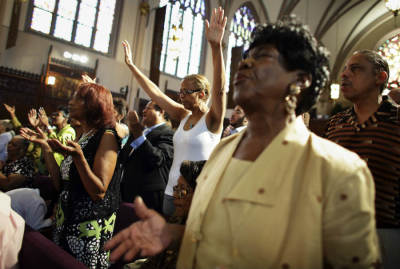Feeling politically powerless, black Christians find more comfort in black church: study

While feeling more politically powerless, black Christians have been increasingly finding more comfort and control being part of the black church in recent years, a new report from Barna Group shows.
The report, which is one of several looking at the state of the black church in America was developed in partnership with Black Millennial Cafe, Urban Ministries, Inc., American Bible Society, Compassion International, Gloo, and Lead.NYC. It describes how black Americans, including members of predominantly black churches, perceive the role of the Church and their political views.
Among the findings of the report is the dramatic increase in 2020 of the share of black Americans who agreed that being associated with the black church is comforting because it is a place where black people have control over their lives compared to 1996.
In 1996, 50% of black Americans agreed with that statement while 41% disagreed. In 2020, however, the percentage of black Americans who agreed with the statement shot up to 65% and among black churchgoers it was a staggering 80%.
The data also show increasing feelings of political powerlessness among black Americans. In 1996, 61% of black people said they felt politically powerless in general and by 2020, that feeling of political powerlessness had increased to 73%. Among black churchgoers, 75% expressed the same feeling.
"I believe in vigilance in every area of potential injury to Black communities,” Rev. Brianna Parker, CEO of Black Millennial Café, said in a statement released Monday. “This data on perceptions of political powerlessness allowed the church, social justice organizations and spaces I occupy as a data activist to activate Black voters. Twenty-plus years without extensive data in Black faith communities left a deficit in resources and prohibited opportunities. As a lead researcher of this study, I am proud of the work this project will do for Black churches and communities in an age when racial disparities are being highlighted and exposed as an opportunity for change. This data assists in that change."
Among all black adults, the report shows that 67% considered themselves to be Democrat, 19% Independent, 8% had no affiliation while 6% considered themselves Republican. For black churchgoers, 76% identified as Democrat, 14% Independent, 5% Republican and another 5% had no affiliation.
A significant part of President-elect Joe Biden’s outreach to black voters, who came out in droves to support him during the 2020 president election, came through the black church during a time of significant racial unrest. The upheaval also created contentious disputes over issues of race in the Southern Baptist Convention, the nation’s largest Protestant denomination, such as critical race theory.
“This important research further establishes the Black community’s understanding that the primacy of Christian faith, justice, and practice is embraced and propelled in times of financial crisis and political upheaval,” C. Jeffrey Wright, president and CEO of Urban Ministries, Inc., said in a statement. “This study underscores this historic moment, in the midst of a devastating pandemic and the aftermath of one of our nation's most contentious transitions of power, when America must now undertake a second Reconstruction.”
Brooke Hempell, senior vice president of research at Barna, said: “The story of the Black Church in America is important for our nation and for Christianity. We have conducted hundreds of studies about faith and culture, and we have found consistently that Black Americans have a more active faith — in prayer, reading Scripture, and worship — than other racial groups in this country. We are excited to share the story of this legacy with fresh data.”



























